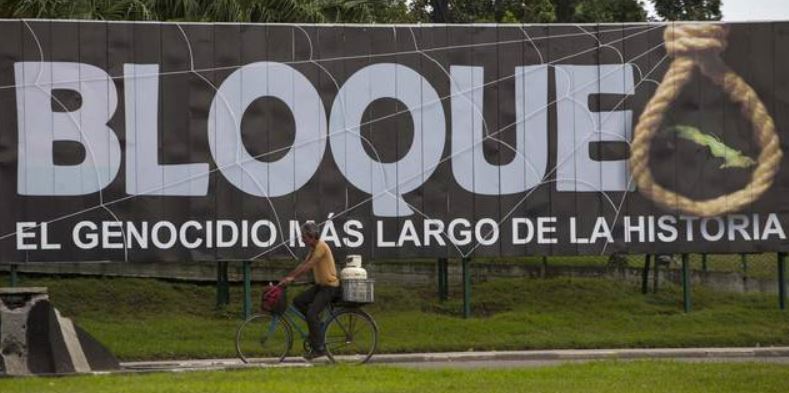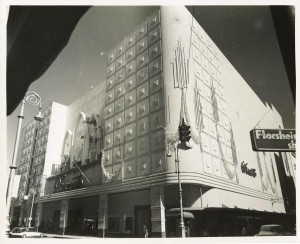When President Barack Obama visited Cuba in March 2016, the USA-imposed blockade or embargo or quarantine or whatever-else one wants to call it was the elephant on the island. It was the elephant in the room at every meeting between our officials (who numbered close to twelve-hundred) and theirs. We owe Cuba a huge apology. Of course, we didn’t offer one.

Yes, Cubans once-upon-a-time tried to protect themselves from our overwhelming military power; our subversion; our unrelenting sabotage; our many plots to undermine and demoralize the Cuban revolutionary movement, which had overturned the Batista cartel and drove its Mafia friends off the island way back in 1959, a long time ago. We didn’t like it when the Cubans turned to the Soviet Union for help to defend themselves.
Let’s face some facts: It was 6 million of them against 220 million of us. It wasn’t going to be a fair fight. The Cubans were going to lose, and they knew it.

Fifteen months after the revolution, in March 1960, someone blew-up a French ship in the Havana Harbor, which killed and wounded hundreds of civilians. Cuban police arrested a suspect who, it turned out, was an American with ties to organized-crime and CIA operatives; his team managed to infiltrate harbor-security, police said.
Strange people started flying airplanes over the island on a daily basis to bomb sugar refineries and drop napalm on sugar cane fields. The Cubans managed to shoot down one aircraft and rescue the pilot. He turned out to be an American. Authorities blamed the CIA.
Then, just a few days before the Bay of Pigs invasion, terrorists bombed and burnt to the ground El Encanto, one of Havana’s upscale department stores.

Cubans had no clear idea, even as late as April 1961, that the USA was systematically destabilizing the island and had already finalized plans to invade Cuba and assassinate its leaders.
A few days after the El Encanto firebombing, the invasion-force launched its assault — on Monday, April 17. It included close air-support, a squadron of B-26 bombers, and ships standing off-shore. The assault would come to be called the Bay of Pigs fiasco, mostly because the invaders ran out of ammunition and were forced to surrender.
Fidel himself led the island’s defense; Soviet intelligence informed him a few days in advance of the exact time and place; by some miracle related to our own incompetence, Fidel and his Cuban fighters repulsed the invasion.
Castro’s Cubans managed to capture 1,200 invaders, mostly CIA-trained expatriates, who they later traded for medicine. Afterwards, they begged the Soviet Union to get more involved, because they believed the USA would attack again. Maybe the next time the USA would send more ammo and a bigger air-force, and Cuban defenses wouldn’t hold up.
Our government wasn’t too happy about the deal Cuba made with the USSR. The Soviets took advantage of Cuba’s weakness, Che Guevara would later claim. Che told Fidel and the Soviets that the deal was one-sided and not good for Cuba.
The alliance between Cuba and the Russians almost started a nuclear war, because the Soviets insisted on putting nuclear missiles on the island and basing nuclear-tipped submarines in Cuba’s harbors.
The Russians believed that the island could not be successfully defended against a full-on USA invasion using conventional weapons alone. Had a nuclear-missile exchange occurred, neither Florida nor Cuba would be habitable places even today, fifty-four years later. Millions of Cubans and Americans would have died.
Fortunately, deals were made and tensions de-escalated. The Soviets loaded up their weapons and took them home.
For the United States the fight was just beginning. Although the USA promised the Soviet Union that it would not militarily invade Cuba again (rendering nuclear defense unnecessary), it did not promise anything about an embargo. The United States talked and threatened every country in the Western Hemisphere into imposing one. The only country that refused was Mexico.

The embargo has never ended. It has lasted fifty-four years and turned Cuba into a time-capsule from the 1950s, which in one of the great ironies of world history has propelled Cuba into an elite group of the most-in-demand tourist attractions of modern times.
The Cubans have complained vociferously about the embargo at the United Nations, but they have never fought back in kind; even after we poisoned their sugar; even after we sunk the ships of their trading partners; even after the Bay of Pigs invasion, when we killed and wounded five-thousand Cuban citizens; all they asked was to be left alone.
Che Guevara resigned his Cuban citizenship in October 1965 and left the island never to return. He hoped to inspire revolutions closer to Argentina, his native country, but he also may have believed that his departure would help to take USA pressure off the Cuban people. It didn’t work.
A fifteen-hundred man force trained by the CIA in Guatemala hunted down the beloved hero of the Cuban revolution, shot him in the legs a few times just to hurt him, then they executed him. They cut off his hands and sent them to Fidel Castro. A CIA agent who witnessed the murder has been quoted as saying that Che never cried out in pain before he died. He died as brave as he lived, without fear, the agent said.
Cuba refused to even consider assassinating our leaders, even as we worked overtime in every depraved way we could think of to assassinate theirs; the assassination plots against Fidel Castro are in the public record and make a wicked read, if anyone wants to look them up.
People who visit Cuba will tell anyone who will listen that the Cubans are a friendly, peace-loving people who were brutalized by a ruthless cartel in alliance with powerful crime syndicates; crime syndicates which would years later come to be called the Mafia.
Everyone on the island (90%, anyway) joined in the effort to get rid of the thugs who were abusing the population on a daily basis. People who fought the Batista family and his cartel and were unlucky enough to be captured were routinely tortured, some to their deaths.

What kind of country keeps an embargo going for 54 years against another country that is no longer a threat?
The only threat Cuba poses to our billionaires is the example it has set; the lessons it has taught the world that it really is possible to create wealth cooperatively and share it; it really is possible to survive an assault by the most militarized and corrupt nation on planet Earth; it really is possible to choose a different path — a path that doesn’t involve capitulation to cartels and billionaires.
Is Cuba perfect? No; not even close. Of course they aren’t perfect. No nation, no individual, no organization that is shunned and impoverished for fifty-four years by a country as powerful and connected as the United States has any chance at all. How would anyone of us in the USA turn out if the full power the United States turned against us?
I will tell you. If you are lucky enough to survive, as Cuba has, you could turn old and sad. Maybe bitter. We have hurt the Cubans far more than they ever hurt us.
It’s time for this fight to be over. It’s time to make amends. Dispatching on Good Friday four men in their seventies to belch out songs about sex with girls before a modestly attended concert crowd isn’t a good way to start.
It’s time for us to say we are sorry, and mean it. It’s time to be friends. It’s clear to visitors that the Cuban people have in their hearts the desire to forgive us.
I believe that many Cubans want to forge their own path without their vision being twisted by the fear of subversion by U.S. spies and agents. They want to have fun and to be our friends; someday — hopefully sooner rather than later — they will.
Billy Lee


Well pontificated, Billy Lee.
Sad and depressing depiction of our involvement in Cuba. However, I take issue of your characterization of the U.S. being the most corrupt country in the world. And you don’t say much about the abuses of Castro’s government towards his own people. I would say the primary reason that it has taken so long for the U.S. to drop its embargo of Cuba is the power and financial strength of the Cuban expatriates who live in the U.S. who do NOT want to forgive Castro.
As a side note, I am presently reading Cuba Straits by Floridian Randy Wayne White. I was surprised to find out that the Russians still have a strong, unofficial presence in Cuba.
A democratic republic like the USA, if it is loyal to its own citizens and has integrity, should not be overwhelmed by the power and financial strength of a small number of immigrants from any country; certainly not the immigrants from an island with a total population of six million (in 1960).
Randy White, author of Cuba Straits, recently told the Huffington Post that today’s Cuba is a police-state. He can’t know this. He believes it, because it is what Americans have been taught to believe. He couldn’t sell a commercially successful book in the United States if he portrayed Cuba any other way.
The people I know who travel to Cuba and blog about it do not cast Cuba in a negative light. The opposite is the case. Many bloggers who travel there and write about it say it’s a kind of paradise.
Whatever the truth, the embargo only makes things worse. That’s the point of the embargo. We want Cuba to fail, and we have historically done everything we can do since the Bay of Pigs fiasco to destroy Cuba short of military invasion.
Billy Lee
I agree that the U.S. policy has been to try to make Cuba fail. And I totally embrace our lifting of the embargo and the re-establishment of relations. However, Randy Wayne White has visited Cuba quite a few times as a fisherman and as a baseball aficionado. He likes the Cuban people—just not their government.